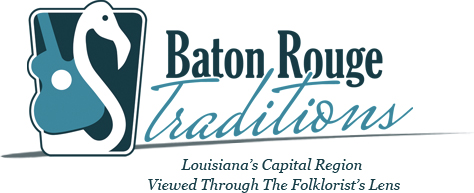
Maida Owens, editor
Baton Rouge Traditions is a compilation of research conducted in the greater Baton Rouge area primarily over the past decade for the Baton Rouge Folklife Survey, the New Populations Project, and other sources. The project was coordinated by Maida Owens, and 22 folklorists and other writers contributed. Together these 39 essays offer a glimpse of this metropolitan area that is the state's capital.
* indicates that a field report is available upon request.
Presentations, Quilt, and Exhibit
In Fall 2017, four Baton Rouge Traditions events were held where the public made squares for the Baton Rouge Traditions quilt. Click here to learn about the Baton Rouge Folklife Survey, the public events, and the making of the quilt. Click here for the exhibit and how to bring it to your Louisiana community.
Table of Contents
Introduction
- Baton Rouge: A Cultural Microcosm of Louisiana - Maida Owens
- Traditions in Baton Rouge: A Photo Essay - Maida Owens
Baton Rouge Gives
- * Stitching Community: Fiber Arts and Service - Laura Marcus Green
- In Noah's Footsteps: Traditions of Animal Rescue Groups in Baton Rouge - Carolyn Ware
- St. Joseph's Altars: Faith in Tradition - Laura Marcus Green
Baton Rouge Makes
- Stitching Memories: Judith Braggs' Black Folk Art Quilts - Laura Marcus Green
- * Folk and Traditional Arts in the Capital Region: Sustaining Community Values Through Handcraft - Douglas Manger
- * Fabricating Fun: Mardi Gras Costumes In The Capital City - Jocelyn and Jon Donlon
- * African American Traditions in Baton Rouge - Maida Owens. Photos by James Terry
- * The Power of Narrative: Tradition Bearers Share Inconvenient Truths - Daniel Atkinson
- Memoirs of an African American Multicultural Self-Taught Folk Doll Artist - Barbara W. Franklin
Baton Rouge Plays
- It's a Very Pink Day in My Neighborhood - the Spanish Town Mardi Gras - Joceyln Hazelwood Donlon
- The Folk Artistry of Sac-a-lait Fisherman Glenn Davis - Douglas Manger
- * Balance of Grace and Strength: Chinese Folk Dancing in South Louisiana - Guiyuan Wang
- The Blue Blues: Larry Garner Doing His Own Thing - Joyce Jackson
- * Blues & Blacks in the Red Stick: Origins, Evolution, and Current Status - Joyce Jackson
- * Jazz, Zydeco, Cajun and Country: Roots-Music Diversity in the Greater Baton Rouge Area - Ben Sandmel
- * My Way To Show Baton Rouge I'm Here: Latino Music and Dance in Baton Rouge - Dominic Bordelon
Baton Rouge Worships
- * Singing To the Glory: Church-based Choirs and Ensembles in Baton Rouge - Liz Williams
- * Sacred Sounds in Baton Rouge Churches, Synagogues, Temples, and Mosques - Maureen Loughran
- Black Preaching Styles: Teaching, Exhorting, and Whooping - Joyce Jackson
- The Gospel Train: The Zion Travelers Spiritual Singers - Joyce Marie Jackson
- * Dancing in the Light: The Nine-Day Festival of Navaratri in South Louisiana - Daria Woodside
- * Satyanarayana Puja: A Hindu Prayer Service in South Louisiana - Daria Woodside
- * Preserving Vietnamese Culture and Language in Southern Louisiana: Altars as Symbols of Identity - Emma Tomingas-Hatch
- Hair Culture among Generational Apostolic Pentecostal Women - Von de Leigh Hatcher
Baton Rouge Works
- * Satisfying Work in Skilled Repair: Traditional Occupations in Baton Rouge, Louisiana - Jon and Jocelyn Donlon
- * A Slice of Life: “Another Reason to Eat Cake” - Laura Marcus Green
- * Living in Style: The Language of Hats - Laura Marcus Green
- * Boudin, Teacakes, and Specialty Grocery Stores: Small Food Businesses in Baton Rouge - Maria Zeringue
- Real Doctors: Folk Traditions of LSU Vet School - Carolyn Ware
- A Master's Touch: Wirt Bellue's Inventions and Reinventions in the Workplace - Douglas Manger
- * Creative Pragmatism at Work: Generational Small Businesses in Baton Rouge - Douglas Manger
- * Legends and Lore of the State Capitol - David Kunian
Baton Rouge Diversifies
- * Moon Cakes, Knotting, and Feng Shui: A Peek of Chinese Culture in Baton Rouge, Louisiana - Jun Zou
- * Places Called Home: Folk Traditions among Muslim Immigrants in Baton Rouge, Louisiana - Jocelyn Hazelwood Donlon
- The Difference Between a House and a Home: Latino Experiences in Baton Rouge - Dominic Bordelon
- The Moon Festival and Other Vietnamese Traditions in Baton Rouge, Louisiana - Cecilia Vo
- Commodifying the Gift: Two Ethnic Braiding Salons in Baton Rouge - Sylviane Greensword
Acknowledgements
This project was supported in part by a grant from the Louisiana Division of the Arts, Office of Cultural Development, Department of Culture, Recreation & Tourism, in cooperation with the Louisiana State Arts Council, and the National Endowment for the Arts, a Federal agency and with support from the Arts Council of Greater Baton Rouge and The Giving Quilt. Inc. Additional funding was from an Archie Green Fellowship from the Library of Congress to support occupational folklore research.
The 31 interviews supported by the Library of Congress are included in the American Folklife Center's Occupational Folklife Collection and can be found here. All interviews from the Baton Rouge Tradition Project are archived in the Folklife Program Collection at Louisiana State University Library's Special Collections.






